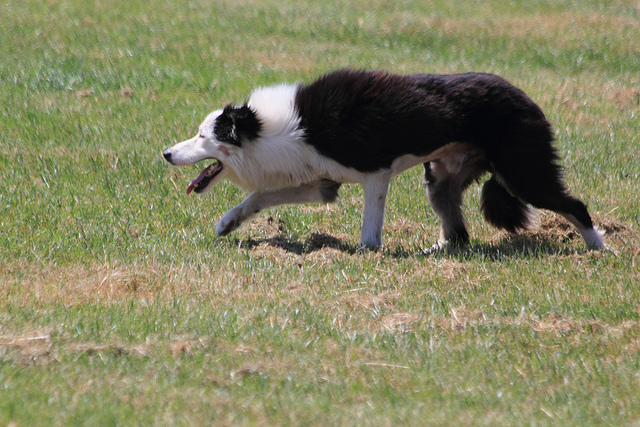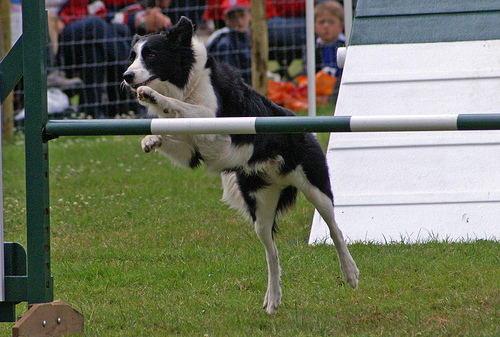Breed Profile – Border Collie
31/12/2015
The breed profiles that we started to publish a few months ago have proved exceedingly popular with our readers, so we’ve decided to keep the theme going for a few months – or until we run out of breeds we know something about! This time around, it’s one of our favourites, the Border Collie.
 History of Breed: Border Collies were originally bred and used in the Anglo-Scottish borders (hence the name) for herding sheep. Bred for their intelligence, agility and obedience, but never for appearance, they soon came to be used throughout the UK for their primary job as a superb sheep dog. Less well known is that they also make excellent sniffer dogs.
History of Breed: Border Collies were originally bred and used in the Anglo-Scottish borders (hence the name) for herding sheep. Bred for their intelligence, agility and obedience, but never for appearance, they soon came to be used throughout the UK for their primary job as a superb sheep dog. Less well known is that they also make excellent sniffer dogs.
Life Expectancy: 10-14 years with an average lifespan of 12 years.
Size: Border Collies are classified as a medium dog and the breed standards dictate that dogs should be 53cm at the shoulder and bitches slightly less.
Features: The coat is either short or moderately long, but always short on the legs, apart from the feathers. The coat is weather resistant, with a soft, dense undercoat and medium, dense overcoat. Having never been bred for appearance, Border Collie coats can be seen in a variety of colours, but never predominantly white. They have a tapered muzzle, which is quite short and strong, and medium-sized, sensitive ears, set wide apart. Their oval-shaped eyes are always brown, except in merles (streaky colour) where part of one or both may be blue. The tail is moderately long, with a curl to the end that balances out the look of the dog, but is never carried curling over the back. Border Collies are characterised by their graceful, well-proportioned, balanced, athletic bodies; strong and with a broad chest, but never heavy, thus leading to an agile, tireless movement.
Energy Levels/Exercise Required: As traditional working dogs, bred for long days in the hills, Border Collies have a huge amount of energy and the exercise they are given should reflect this. More than two hours exercise a day is recommended. They are also highly intelligent dogs, so need plenty of mental stimulation too. If they are not kept as a working animal, Border Collies are well suited to agility classes, heelwork to music and flyball clubs, which combine high energy physical exercise with following commands and remembering routines. If kept as a family pet, they will need plenty of long walks to tire them out and games to exercise their brains, otherwise they can be at risk of displaying behavioural problems. A high energy dog like a Border Collie should be fed on a diet specifically designed for working dogs, such as our Heritage Adult or Dr John Titanium, which will have the right balance of protein and carbs to keep them going all day, and also contain supplements to look after those hard-working joints and ligaments as well as vital vitamins for good eyesight and a healthy nervous system.
Potential Health Problems: Hip dysplasia, CEA (Collie Eye Anomaly) and epilepsy may be encountered.
Temperament: Highly intelligent and sensitive animals, Border Collies are also loyal, kind and faithful. Their keen and responsive nature means that they respond exceptionally well to training and then excel in sheep dog work where they need to work to whistle, hand or vocal signals, sometimes at long distances.
Family Dog/Child Friendly: Border Collies have an instinct to work, which can go against the grain if they are forced to be domesticated pets. However, if time and effort is put into early socialising and training when they are young and the family is dedicated to fulfilling the Border Collies desire to work by providing plenty of exercise, challenging activities and games, then they can make a good family dog. Households where the occupants are out at work and/or school all day may want to think carefully before getting a Border Collie. If left alone in the house all day, they may resort to chewing and digging to entertain themselves. They will need two long walks every day and plenty of attention in between, as well as structured activities such as flyball or agility classes to replace ‘work’.
Likes: Work, plenty of exercise, complicated games that challenge them mentally, long walks, agility activities.
Dislikes: Being bored, staying in the house all day.

The Kennel Club breed standards were used when writing this articles.
Gilbertson & Page are proud sponsors of the International Sheep Dog Society.


